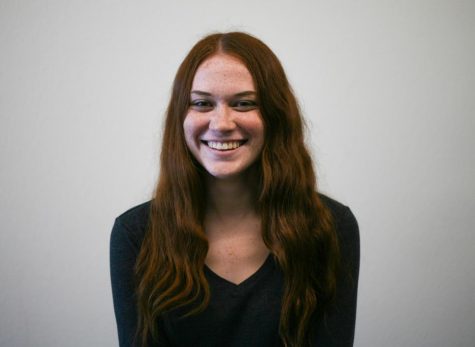
Sorry, I can't hear you, I'm wearing a Goodwill sweater.
January 23, 2018
As a child, he had stars in his eyes. Performing was a passion sparked by his casting as Aladdin in the 5th-grade school play. It was exciting. It was empowering!
And then he went to San Dieguito Academy, where he never took another theater class again.
It wasn’t until attending U.C. Berkeley as an economics and political theory major that his love for theater was finally reignited. He spent his nights putting on one-act plays turned sketch comedies with a student-run organization called “Theater for Charity,” of which he eventually became the production manager. This very organization would pave the way for his journey into the rocky and unpredictable world known as “showbiz.”
Meet Jed Rapp Goldstein, a screenwriter for the Netflix T.V. series “Ozark.” Goldstein talked about his experiences in the entertainment business to Stephanie Siers’s theater class before winter break.
“Ozark” is a crime drama series in which a Chicago family is forced to relocate to the Missouri Ozarks when the father’s money laundering scheme goes awry.
Of course, working in the “Ozark” writer’s room isn’t Goldstein’s first job in the entertainment business. Life before was unstable, employment and income not always guaranteed. After Berkeley, he became part of the resident sketch team for PianoFight, a small theater company in San Francisco, before eventually moving to Los Angeles in pursuit of better acting opportunities.
It was here that Goldstein took a step away from acting and began to explore other theater work. He eventually became involved as the production assistant to a company, through which he met a woman who introduced him to new job working as a post-producer for a Fox Network television show. Unfortunately for Fox, the show didn’t catch on.
“It was called ‘Mind Games,’” Goldstein said. “It went about three episodes into the first season and then they cancelled it…but that’s just part of it.” Not every opportunity works out in Hollywood.
From there, Goldstein moved on to DreamWorks, working as an assistant to an “awful boss” who was very unhappy with the job she had. She provided Goldstein with his “first taste of the two faces someone can have in Hollywood and the chips on people’s shoulders from not getting what they want.”
Despite the unfriendly working conditions, it was there that Goldstein truly committed himself to writing, and it was there that, through another DreamWorks employee, he became an assistant at Aggregate Films. He read and reviewed television scripts under actor and director Jason Bateman.
Then, the “Ozark” script came through.
The rest is history. Goldstein’s boss recommended him to become a writer’s assistant on the show and has now been for two years.
At the beginning of the season, Goldstein and the other writers spent about a month creating the show’s arcs and storylines, pitched them to Netflix, and then took the script-writing episode by episode.
The job, like many, does come with its fair share of challenges.
“The hard part is writing the pilot,” Goldstein said. “Hopefully, if you do a good job writing this pilot, you can imagine ten seasons of things happening because you have good characters and a good setting…It’s tricky to whittle away to what you want to do.”
Not only can getting started and condensing content present an obstacle, but writing a television show doesn’t guarantee year-round employment. This is something Goldstein struggled with in the past.
“I’ll probably have a nine-month hiatus between seasons, so that’s a good chunk of the year to be unemployed, but I love it,” Goldstein said. “I’m not afraid of it anymore.”
Besides, the comfortable and relaxed work environment makes up for any insecurities he might face: into the office at 10 a.m., brainstorming, plotting, writing with nine other collaborators, usually clocking out by 5 p.m. But, in hindsight, the informal atmosphere is meant to promote a serene mindset and get creativity flowing, Goldstein said.
The imagination sparked in the writer’s room is encouraged by Netflix’s very “hands-off” approach in regards to the script and storylines they take on
“Once they pick the shows, we see them two days of the year,” Goldstein said. “They trust their creators…They pick people they want to work with and say ‘you do your thing, we’re not going to meddle with it.’” It was an abrupt change from previous studios he has worked at, such ABC, which are directly involved in and in control of every aspect of their television shows.
Once the first few “Ozark” episodes are written, they are set into motion with the actors in Atlanta where the writers follow to cover their individual episodes. Even then, the scripts are open for minor adjustments until the final edit. “Actors will sometimes come to directors and be like…‘I don’t think I’d do this,’ or ‘I feel like I’d say this differently,’” Goldstein said. “That’s actually very important. Actors have the final line in what’s being said.”
For Goldstein, collaboration and branching out are major key players in making it in the industry.
“Talk to everyone…You want to find the people who you share similar aesthetics, similar tastes with,” Goldstein said. “You’re never going to make something amazing without a community.”
Equally as important is taking risks and chances that will broaden the theatrical scope and in the end provide opportunities one may have never considered.
“Just commit to something. If it goes wrong, you’ll have learned a bunch and you can do something else. Or, if it goes well, you have a really-early start on it,” Goldstein said. “Whatever’s feeling good and feeling right to you, just go for it.”

Sorry, I can't hear you, I'm wearing a Goodwill sweater.